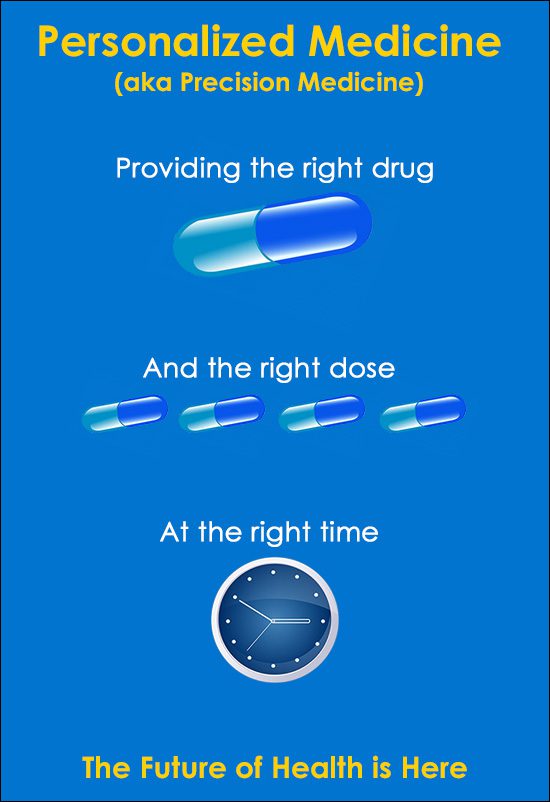The Human Genome Project was completed almost 20 years ago by the National Institutes of Health (NIH) and the U.S. Department of Energy and mapped the 3 billion units of DNA that make up the human genome.
Such an enormous undertaking took scientists more than a decade. As a result of their dedication, researchers are now in the process of developing an entirely new approach to treating chronic illnesses, such as cancer, diabetes, heart disease, neurodegenerative diseases and addiction called Personalized Medicine.

Personalized or Precision Medicine is exactly what it sounds like: treating a chronic disease tailored to an individual’s unique genetic code.
More technically, as U.S. News and World Report writes, “It involves identifying genetic, genomic, and clinical information that allows accurate predictions to be made about a person’s susceptibility of developing a disease, the course of the disease, and its the response to treatment.”
With this genetic knowledge, scientists can test various treatment approaches for the same condition in people with different genetic and chemical natures.
What Are the Benefits of Precision or Personalized Medicine?
- Medical decisions based on better and more specific information
- Targeted therapies result in an increased likelihood of positive outcomes
- Greater ability to predict and prevent disease rather than react to it
- Decrease in negative drug effects due to genetic metabolic testing
- An overall reduction in healthcare-related costs
Cancer patients have benefitted the most from personalized medicine so far. By undergoing a genetic test, physicians are able to pinpoint what medications will work best for their patients. This eliminates much of the time wasted experimenting with ineffective drugs and, in many cases spares the patient from debilitating side effects.
Though this practice is still in its infancy, most experts agree it is medicine’s future. So much so, the Obama Administration set aside a proposed $215 million of the 2016 budget for what The White House calls the Precision Medicine Initiative. The president’s plan is largely supported on both sides of the aisle.
What is the Four-Step Process of the Precision Medicine Initiative?
- $130 million to the National Institutes of Health for organizing and overseeing a million volunteers who will analyze genetic data
- $70 million to the National Cancer Institute for continued research in fighting the disease through the use of personalized medicine
- $10 million to the U.S. Food and Drug Administration (FDA) for creating and maintaining nationwide databases to support the program’s research efforts
- And an additional $5 million to the FDA for developing a secure patient data-sharing system
The disease of addiction has not been for forgotten as it concerns personalized medicine. Medication assisted therapies, such as acamprosate and disulfiram for alcoholism or naltrexone and buprenorphine for heroin, are not new in the treatment of addiction.
These drugs, however, are not successful for everyone. Genetic metabolism testing and personalized medicine allow research into why the medications work for some and not for others and, in turn, what adjustments are needed to remedy the discrepancy.
The reach of personalized medicine continues to expand. Part II of this series will examine genetic metabolic testing for mental health conditions.
The Substance Abuse and Mental Health Services Administration reports that an estimated 7.9 million adults in the U.S. suffer from both substance abuse problems and mental health conditions. This is yet another trail that personalized medicine for addiction is blazing. The future really is now.
Related:
What if You Knew Depression as Both a Doctor and as a Patient?
Medication Assisted Treatment – An eBook by the Partnership for Drug-Free Kids





